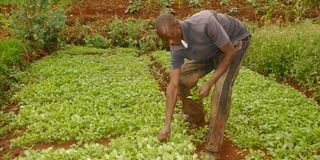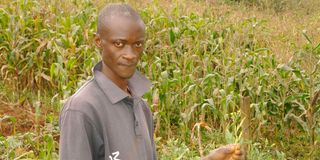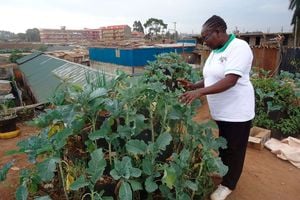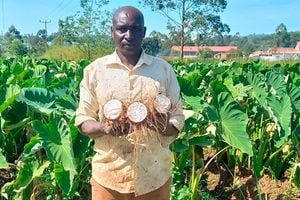
Samwel Kedogo weeds a seedbed in his farm.
Traditional vegetables are a rich source of nutrients. They are also of economic value, especially in rural areas, because of ready markets.
There are about 200 varieties of traditional vegetables, with the common ones in Kenya being cowpeas (kunde), Jute mallow (mrenda), pumpkin leaves, pig weed, spider plant (saga), amaranthus (terere), Bacella alba (nderema), black night shade (managu or suga) and crotalaria (mitoo or miroo).
These vegetables are also grown in urban centres by residents who want to make an extra coin and for their own consumption.
After asking friends and engaging in online research, Samwel Kedogo – who is also a security guard – started growing traditional vegetables, encouraged by the ready market and the ongoing campaign to eat healthy.
Kedogo’s customers include retailers, wholesalers and ordinary Nairobians.
It is eight years since he embarked on the indigenous vegetable-growing journey after acquiring a piece of land in Kabete.
Kedogo says he always had a passion for farming, even before leaving his ancestral home on Vihiga County for work in the capital city.
His first profit was about Sh10,000. It motivated him to expand the agribusiness.
The farmer has divided his land into tiny pieces where different vegetables are grown rotationally.
He took to growing traditional vegetables because they take few months or weeks to mature – about a month and a half – and have a ready market.
Because of this, the guard can harvest his vegetables almost throughout the year.
Traditional vegetables were on high demand during the Covid-19 pandemic. Many urbanites thought they were medicinal and could help them battle the deadly virus.

Samwel Kedogo at his vegetables farm in Kabete.
Vegetables from one of the tiny sub-divided plots can go for Sh600 to Sh800 at wholesale price.
However, one parts with about Sh150 for a kilogramme of the traditional vegetables.
The type of vegetable, season and supply determine the market price.
Kedogo ensures he has 10 to 20 seedbeds of different vegetables every season. His seed beds are properly managed and weeded. Pests and diseases are also controlled.
After properly ploughing the land, Kedogo plants and applies organic manure. When the vegetables sprout, he waters them and weeds the land.
Kedogo says some vegetable seeds are expensive. To beat the cost, he lets some plants mature to the point of producing seeds, which he gets for the next generation of the vegetables.
“A can of lauki seeds goes for Sh1,800. That is very expensive, so I leave some plants to mature for seed production. This cuts costs in the subsequent planting season,” the security guard tells Seeds of Gold.
His greatest challenge is the cold associated with Kabete, especially between June and August. This badly affects growth and maturity.
Downpours also lead to floods that sweep his produce away. Irrigation comes in hand in dry months.
The high cost of fertiliser, pesticides and insecticides also eats into his profits.
Kedogo says vegetable farming has added value to his life, greatly improving what he earns as a guard.
“I have built a permanent house at my rural home, educated my siblings, bought a water sprinkler and taken care of basics, thanks to the vegetables,” he says.









